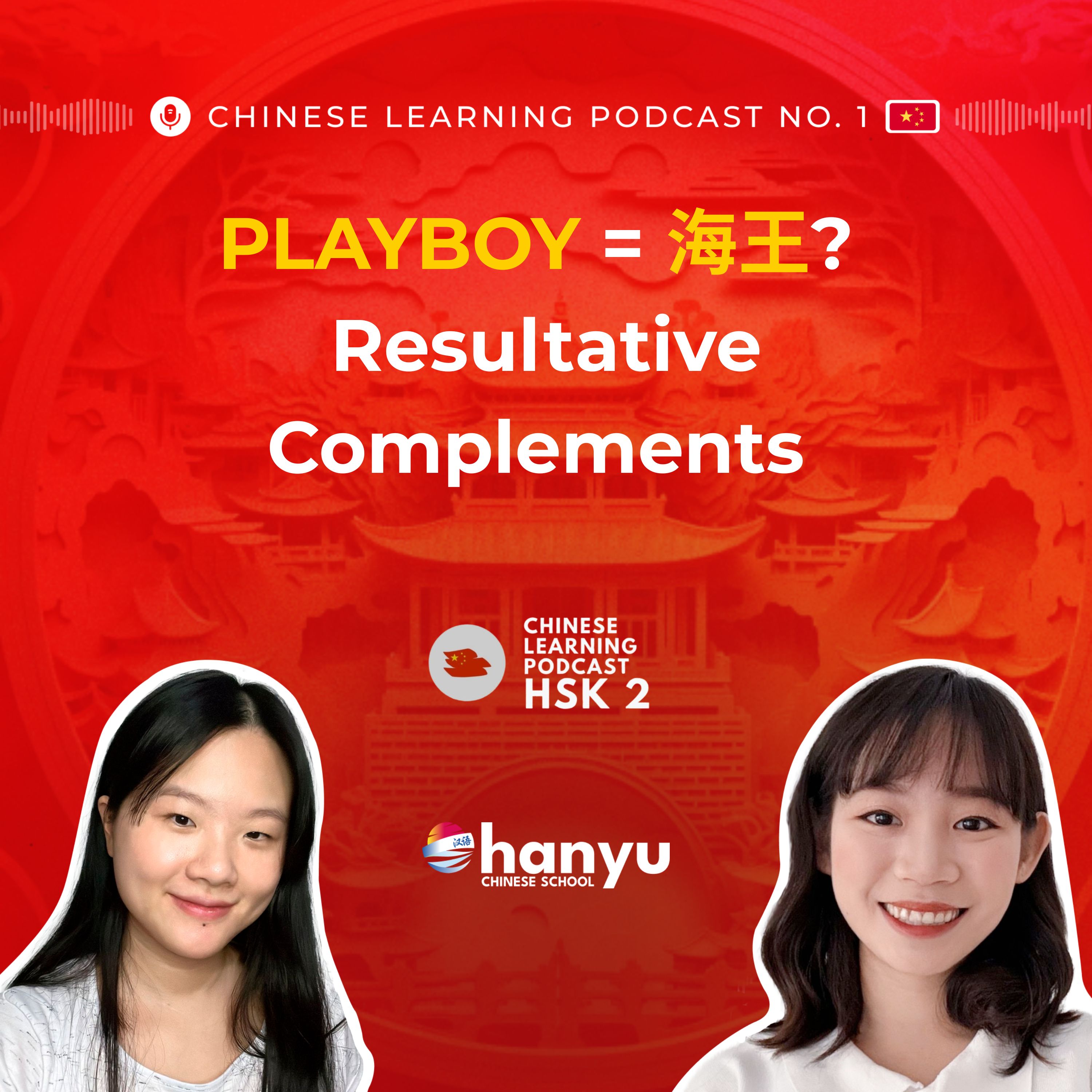Episode Transcript
[00:00:00] Speaker A: Foreign.
[00:00:12] Speaker B: Hi, everyone. Welcome Back to our HSK2 podcast. And Vicky. And here we have Emily today. How are you, Emily?
[00:00:38] Speaker A: Wow.
[00:01:16] Speaker B: Well, it is what it is.
[00:01:21] Speaker A: Yeah.
[00:01:22] Speaker B: Okay, so what are we going to talk about today?
[00:01:27] Speaker A: Yes, so for today.
So these are some phrases that are super useful for you to plan your near future.
[00:01:43] Speaker B: Yes.
We also show you examples from real dialogues.
[00:01:48] Speaker A: So.
[00:01:49] Speaker B: So you can see exactly how native speakers use them. By the end of this lesson, you will be able to confidently say things like, I'm about to go to the library or the new semester is just starting tomorrow.
[00:02:05] Speaker A: Yes. And of course, we have a fun culture segment as well. So we're going to talk about the term that leftover woman in China. So get ready and don't forget to make your own sentence as we go along.
[00:02:20] Speaker B: Yes. So before we start, if you are listening to High Engine School, you are listening now to High in Chinese School podcast. If you're. If you're learning Chinese and want to improve your skills, you can visit our website.
We have courses starting from €39 with live classes, recorded lessons, and a full access to our online campus. So you can learn at your own pace. So just visit us and choose your path.
So now let's start with our dialogue. So the setting is we. We are on a phone call between two friends, me and Emily.
[00:03:07] Speaker A: Okay.
La.
[00:03:39] Speaker B: Woman.
Okay, so now let's dive in, into the dialogue.
Sorry. Let's dive into the grammar.
So in Chinese, yao, qu, yu, y are used to talk about events that are about to happen.
So let's start with Y, which means like will or about to. So you can see the structure is subject + y + verb + object + so it indicates that something is going to happen soon. So can be used with the word minty.
So let's see an example from the dialogue.
There's an exam next week.
[00:04:46] Speaker A: Very good. So let's also look into some extra examples. First of all we have here is I'm going to the library. Of course, this means also like, oh, I'm planning and it's planned. I am going to like future action.
But also means like, oh, this is planned. I am doing this.
If we have.
If we talk about future action, I think from HSK1, people learn about.
But this is something more like, oh, I will go to the library. But you don't know when exactly. But if you use means like oh, I'm going now. So you. It's like it's planned.
So let's read another example.
I'm going to see the teacher tomorrow. So as we talked about before. It's something that we planned and we're going to do in the future.
Yes.
[00:05:52] Speaker B: So let's see.
Kuai yao, which means about to soon or very near. The structure is subject verb, object.
So it's used for events that are imminent like cannot be used with or shows that something is almost happening.
Let's see an example.
Super nervous.
[00:06:27] Speaker A: Okay, so the other example that we have here is so the train is almost at the station. The train is coming or so the weather is about to get cold. It's not cold yet, but it's about you.
Yes.
[00:06:50] Speaker B: So let's move on to which means just about to emphasizing immediacy. So the structure is the same. We have the subject plus verb plus object plus the the highlights is that highlights the event that is just about to happen. Like there's a stronger sense of immediacy than yao for. So from the examples from our dialogue, we can see the new school term is just about to start tomorrow.
Or my dad is just about to come home.
[00:07:42] Speaker A: Very good.
So there are extra example that we have is we are just about to have dinner. So it's like right now we're gonna have dinner like right this moment, within a minute or the movie is about to start.
So like Vincent said, it's more about emphasizing something that happened immediately.
[00:08:11] Speaker B: Yes. To summarize, Yao can refer to general near future events while kuaiao adds urgency, used mainly for very soon events. And Jiuyao emphasizes immediacy and often asks emotion or excitement. You can also combine with L to make the action sound in need. Imminent.
[00:08:37] Speaker A: Okay, Very good.
So now it's your turn. Try to translate this into Chinese using so the sentence is I'm about to start cooking dinner.
Yes.
[00:08:53] Speaker B: Think carefully which grammar words fits better.
Consider the immediacy. So leave your answer in the comments below. I will check them.
So now is the turn of.
Let's review their lesson. Let's review the dialogue we said before.
So Emily, you can start.
[00:09:18] Speaker A: I start?
The new school's term is just about to start tomorrow.
[00:09:36] Speaker B: Yes. Did you hear? There's an exam next week.
[00:09:47] Speaker A: Don't worry. I also need to prepare for studying. We can go to the library together.
[00:09:56] Speaker B: I'm about to be super nervous.
[00:10:03] Speaker A: It's okay, we'll study together.
[00:10:12] Speaker B: Great. Shall we meet after class tomorrow?
[00:10:23] Speaker A: Oh, my dad is about to come home soon. I need to go first.
[00:10:30] Speaker B: Okay. See you tomorrow.
[00:10:34] Speaker A: Perfect.
[00:10:36] Speaker B: Okay.
[00:10:37] Speaker A: Well.
Yeah. So did you guys notice that we. The grammar that we used.
Okay. And thank you guys so far. Thank you guys to Join us so far until the middle of the episode.
We hope that you have been enjoying this episode.
With our classes, you can even make more progress. We are the top rated online Academy, over 3,000 satisfied students and we have an overall rating on it 4.8 out of 5 based on over 200 reviews. So we offer courses starting from just €39, including group classes, individual classes, recorded classes, and a 24,7 platform.
So if you like to start learning step by step, try free class and see for yourself.
You can find everything here down in our website, www.hanyuchineschool.com or scan the QR code right here and you can see everything that is on the Internet.
Okay. And then if you want to listen to more about our podcast, you can also Visit our here www.campus.chinese school.com podcast.
We have podcasts also on all kinds of platform. Spotify, YouTube, Twitch, Apple Podcasts. And you can choose whatever platform that suits you the most. Okay, so very welcome you guys.
[00:12:13] Speaker B: Okay, thank you, Emilian. So now let's move on to a very interesting topic. So today we are going to talk the word, or what we call in Chinese, no, in English, leftover woman. What does it mean?
[00:12:33] Speaker A: This?
Yeah. Well, I would say if you trans translate it to English, it feels a little bit offended.
[00:12:43] Speaker B: Yeah.
[00:12:43] Speaker A: So let's dive into it to talk about it. And it true, it literally translates as leftover woman. And it often used for women they're in their late 20s or older who aren't married yet.
So it's probably pretty shocking for people that heard this or this kind of culture for the first time.
[00:13:08] Speaker B: Yeah, but the meaning goes deeper. In China, women can feel intense pressure to get married.
Families, friends, and even colleagues often ask, like, you're already at 28 when you're going to get married.
[00:13:31] Speaker A: Yeah, I heard this a lot. Like for Chinese people when they're over, I think when they're over 25.
[00:13:40] Speaker B: Yeah.
[00:13:41] Speaker A: Think about this. Like, when you're getting married, do you have a boyfriend or do you have a girlfriend yet?
This is what I've heard. Correct me if I'm wrong, but. Because in China, in Taiwan, it's a little bit later, people start asking about 28 to 30. This is the, the time that in Taiwan we would get asked about these kind of things. But I heard that in China it's like, it's really early. Like for me, 25 is just, it's just a year that you just finished college and you should be starting to get into know the new world, right?
[00:14:21] Speaker B: Yeah, yeah. You're right. Actually, like in China, big cities, like start asking you like 25, 28 or even 30. But you have other cities that are like, you know, more traditional, and they start like asking you when you're just 20, like you're starting. Starting college. So, yeah, it really depends on like which part of China, but it's actually very common.
[00:14:46] Speaker A: Oh, God. Yeah, I know. Because China is a really big country and there's like a lot of different kind of culture inside. But. Yeah. So this kind of pressure is social, not just personal. It's not just for girls. Also, like, guys will get these kind of questions to be asked as well.
So many women today are choosing, like, to be more independent, forcing on careers, not just to be like, finding the right person. That's not the main goal for the woman right now.
So there's a big part of something that we call nixing Ju Xing, called female awaken.
So these kind of.
This kind of feeling is like stronger and stronger for the young generation. I personally think it's really good.
[00:15:39] Speaker B: Yeah. Yeah. A very good example of this new Xing Ju Xing.
It's the TV show which in English is known as Sister who make Waves.
So it features women over 30 pursuing their dreams in entertaining, like in the entertaining world, proving that life doesn't end like at 28 or 27. Like, they show the.
The show celebrates talent, confidence and independence directly. Like challenging the idea of shen.
[00:16:22] Speaker A: Yes. So in society, some women reclaims the term in, I think in a more interesting way. Like on social media, you would see hashtags like, it's like, I'm not leftover, I'm just being picky. So shows that they are turning this kind of thing into more like into an empowerment.
[00:16:50] Speaker B: Yeah. So here's something fascinating for learners. Parents sometimes gather in park with marriage markets, posting information about their children, hoping to find matches.
While it may seem unusual in Western audience, it's deeply rooted in tradition and social harmony in some way.
[00:17:15] Speaker A: Yeah, exactly.
Media isn't always really positive.
Shengnu can be like, depicted or as picky or lonely, but in reality, many more women are filled with careers, independence, so they're making their own choices.
So learning this term, we're not encouraging you to use it as a daily conversation, but to get to know more about the culture, the background.
This is kind of something that the Chinese generation, the young generation, is going through.
[00:17:58] Speaker B: Yes.
And for learners, this cultural insight is golden. Like it teach you not just vocabulary, but the social context behind the phrases. Like when you say shen nu, what does it mean like what is really like for Chinese women? What really means this when someone call them Shen?
And also like, it also figures the pressure people will face in their daily life now. And also it shows like the growing empower empowerment of women in China.
[00:18:35] Speaker A: Exactly. So next time if you heard, if you hear this vocabulary, you'll understand how it's a complex mix of social patience and personal choice. All these kind of things. And also if you like to watch shows like, like we just talked about, you'll see how women are redefending success and marriage in modern China.
[00:19:02] Speaker B: Exactly. Understanding these cultural dynamics makes your conversation with Chinese speaker much richer.
You'll catch jokes, references and social commentary that textbooks never teach.
So.
So. Okay, well, let's move on to the answer we previously asked.
Let's check the answer.
How would you say I'm about to start cooking dinner?
[00:19:36] Speaker A: Yes.
So you can so also, you can also say these two, these two answers are both correct.
Or like we said, shows it immediately.
But if you say it's also correct.
[00:20:09] Speaker B: Yes. Remember, wouldn't work here if you mean literally in a few seconds because kwaia usually doesn't refers to immediate action with exact time.
[00:20:23] Speaker A: Okay, so now it's your turn. Try to make a sentence using and feel free to leave us a comment.
We will check it and we would like to review it with you guys.
[00:20:42] Speaker B: Yes. So just write your answers in the comments below.
We would like to see how crazy examples you can make with Yao Kuai or Julia. Or even if you want to talk about what do you think about the word, you are also welcome to write in the comments. What do you think about this like the. The cultural insight we previously talked about.
So thank you for staying with us until the end. If you truly learn Chinese, if you really want to learn Chinese with really, really good teachers and a very clear method, you can just Visit our website hanyechineschool.com and book your free class. Remember, we have courses that just start with €39. That includes live classes, recordings and a very complete flat platform that can help you progress step by step. And all our podcasts are organized at our website campuschool.com podcast. And if you also want to listen to English podcast, you can actually Visit to campus trainland.com podcast.
[00:22:00] Speaker A: So.
[00:22:01] Speaker B: So see you in class.
[00:22:03] Speaker A: Yes. So great job. Today you have learned how to talk about events that are about to happen, practice the fine dialogue and discover interesting culture topic like Shengnu.
[00:22:16] Speaker B: Yeah. For the next episode we're gonna learn about three very important grammar words.
So you'll see how to make a request, give instruction, or tell someone to do something in a very polite way.
[00:22:36] Speaker A: So don't forget to practice your grammar today and make your own sentence. Leave us a comment. Feel free to tell us about anything and we'll see you in the next episode.
[00:22:48] Speaker B: Yes. And don't forget to give us a like and subscribe. Yep. So thank you so much for for staying and see you in the next episode. See you guys.


